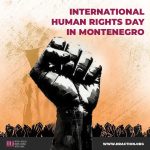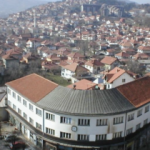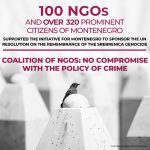
HRA SURVEY SHOWS THAT A THIRD OF JUDGES AND PROSECUTORS, MORE THAN THREE QUARTERS OF ATTORNEYS, AND TWO THIRDS OF COURT EXPERTS BELIEVE THAT THERE IS CORRUPTION IN THE JUDICIARY
22/11/2024
INTERNATIONAL HUMAN RIGHTS DAY IN MONTENEGRO
10/12/202433 YEARS SINCE THE JNA SHELLING OF DUBROVNIK’S OLD TOWN

Dubrovnik is cut off from the world, both in terms of transportation and communication. All I have left are faith and hope. These are the moments when a person either collapses or clings to an ideal—a guiding star, a source of encouragement, a strength to endure.
Pavo Urban, August 1, 1968 – December 6, 1991
Human Rights Action, Centre for Civic Education and Documenta – Centre for Dealing with the Past, remind us that on this day 33 years ago, the Yugoslav People’s Army (JNA) carried out the heaviest shelling of Dubrovnik during its aggression against the Republic of Croatia, which lasted from October 1, 1991, to May 31, 1992. We expect Montenegro’s prosecution to finally approach the prosecution of crimes committed during the war in Croatia seriously and proactively. From Croatia, we expect cooperation and readiness to contribute to the resolution of these cases, viewing the issue of war crimes not just as a national matter but as a regional concern of shared interest for the rule of law and reconciliation.
On December 6, 1991, in Dubrovnik, 19 people lost their lives, and 60 were injured. Hundreds of shells were fired at the Old Town, a UNESCO World Heritage Site. Six buildings were completely destroyed, many others damaged, including the main street, Stradun. The Old Town was subjected to artillery fire for over ten and a half hours. Within its walls, Pavo Urban (23) and Tonči Skočko (18) were killed, while three people were seriously injured.
The Hague Tribunal convicted JNA Colonel General Pavle Strugar to seven and a half years in prison and Admiral Miodrag Jokić to seven years for crimes committed during the shelling of Dubrovnik. Unlike Strugar, Admiral Jokić admitted guilt and was convicted based on command responsibility. On that occasion, Jokić apologized for the attack and expressed regret to the people of Dubrovnik for the victims and damages:
“… On December 6, 1991, two people died, three were wounded, and significant damage was caused to civilian buildings and cultural and historical monuments in Dubrovnik’s Old Town. The fact that these lives were lost within my area of responsibility will remain etched in my consciousness for the rest of my life. I am ready to bow with military dignity before all the victims of this conflict, regardless of the side they were on. Additionally, although I did so during the shelling itself via radio and afterward in person, I feel obligated to once again express my deepest condolences to the families of the deceased and injured, as well as to the citizens of Dubrovnik, for the pain and damage inflicted by the unit under my command. I consider my regret to be a condition for reconciliation and coexistence among the peoples in this region.”
Despite the illegal shelling of Dubrovnik on December 6, The Hague Tribunal did not investigate other crimes committed by JNA members during the six-month conquest of the wider Dubrovnik area. During that period, 116 civilians lost their lives, 194 Croatian fighters and 165 JNA members from Montenegro were killed, 443 individuals were detained in inhumane conditions in the Morinj and Bileća camps, 33,000 people were displaced, 2,071 residential buildings were destroyed, and private and public property was systematically looted. For 138 days, the city of Dubrovnik was without electricity and water, under maritime and aerial blockade.
These facts point to numerous crimes; however, Montenegro has so far prosecuted only four individuals involved in the mistreatment of prisoners in the Morinj camp, located in Montenegro.
Although revisiting responsibility for the events at the camp has been a strategic issue for Montenegro since 2015, it remains unaddressed after nine years. This inertia has been acknowledged in Montenegro’s EU accession process, leading to the requirement under Chapter 23 for the prosecution of “high-level” war crimes, which includes addressing command responsibility, such as in the Morinj camp, which has yet to be considered.
Since Montenegro’s prosecution has shown no proactive approach to prosecuting war crimes, the Special Prosecutor’s Office committed to reaching out to regional prosecutors to transfer any cases within its jurisdiction.
One such case is the one initiated in Croatia 15 years ago, in which former JNA military officers from Serbia and Montenegro were charged with war crimes on the Dubrovnik battlefield: Jevrem Cokić, Mile Ružinovski, Pavle Strugar, Miodrag Jokić, Branko Stanković, Obrad Vičić, Radovan Komar, Vladimir Kovačević, Milan Zec, and Zoran Gvozdenović. They are accused of failing to prevent their units’ actions, contrary to the Geneva Conventions, which included: shelling inhabited areas, killing civilians (116), detaining, mistreating, and forcing civilians to flee, destroying civilian, cultural, religious, and economic facilities, looting, and burning.
According to the court in Split, Radovan Komar and Vladimir Kovačević were born in Nikšić, but their whereabouts remain unknown 15 years after the indictment. In 2022, a warrant and European Arrest Warrant were issued for their capture.
Since neither Serbia nor Montenegro is obligated to extradite their citizens to Croatia for war crimes charges, our organizations have sought information from the Croatian State Prosecutor’s Office and the County Prosecutor’s Office in Split regarding whether the indictment was forwarded to Montenegro’s Ministry of Justice. We also called on Montenegro to inform its citizens about the ongoing criminal proceedings against them in Croatia. Additionally, we asked if transferring the case to Montenegrin judiciary was being considered, as was done in some past cases. Despite repeated urgings, no response has been received. Montenegrin prosecutors remain silent as well, failing to provide the public with any updates for over six months, including whether they have even expressed interest in this case.







 English
English